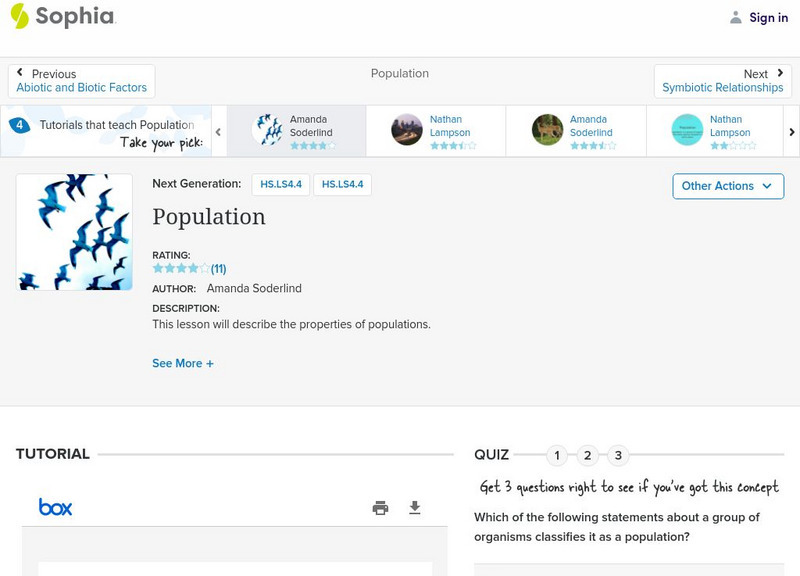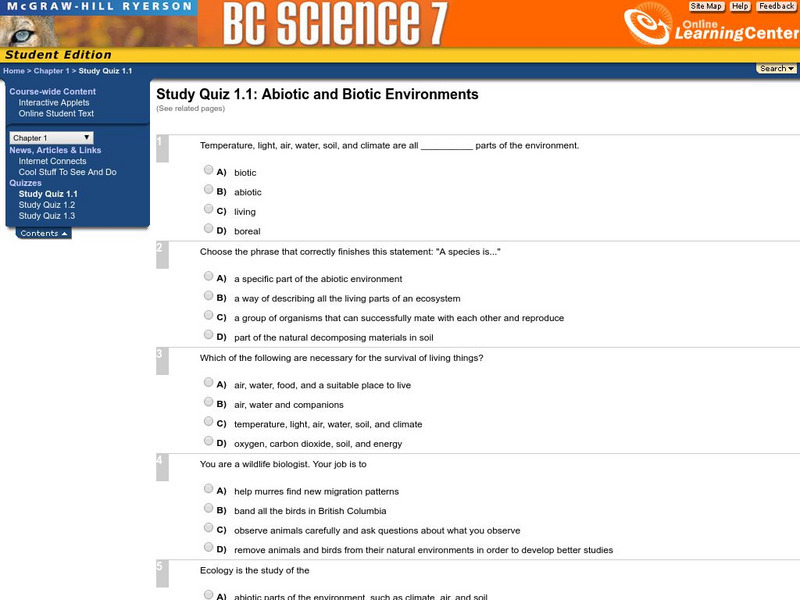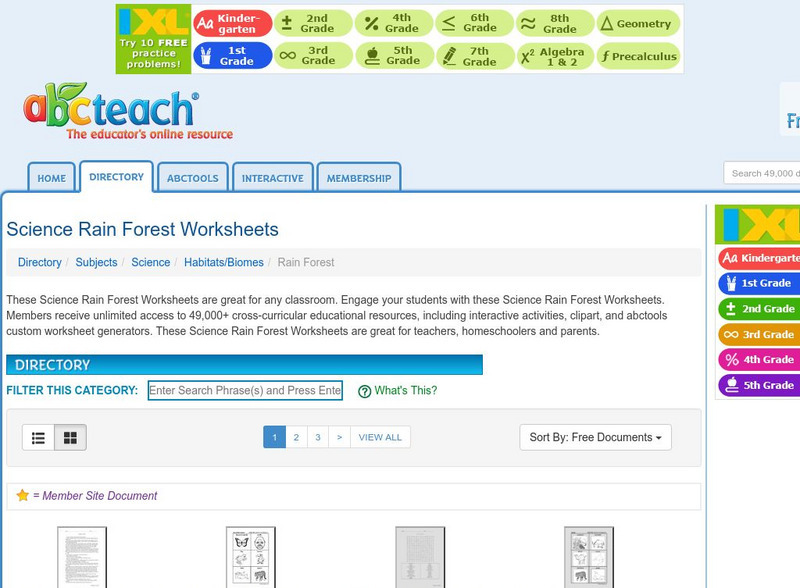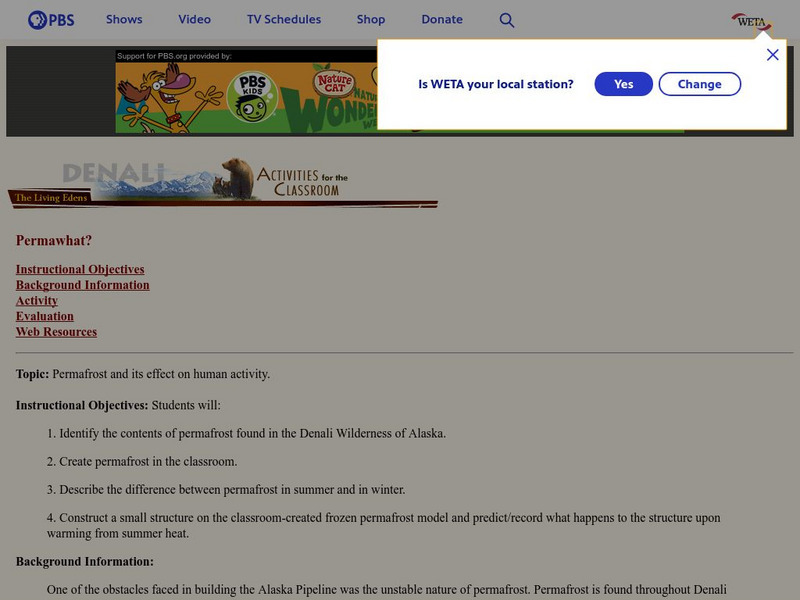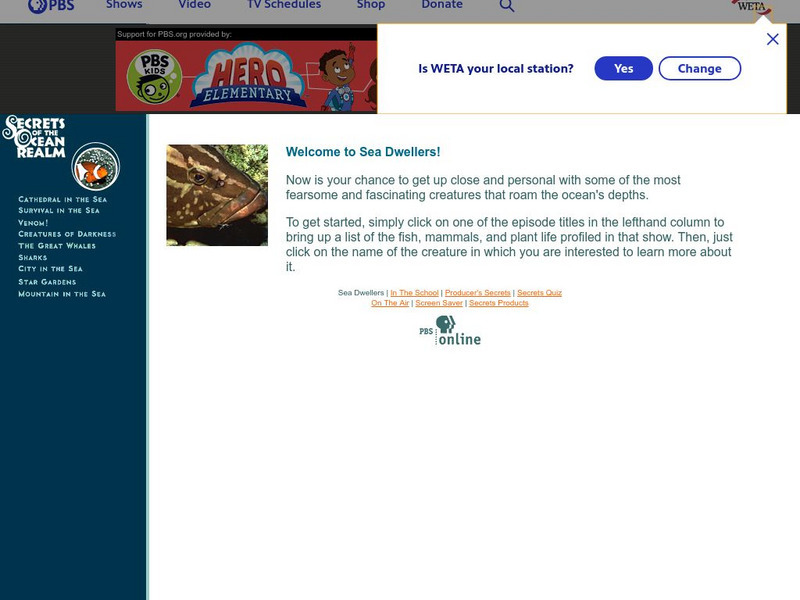Sophia Learning
Sophia: Population: Lesson 2
This lesson will describe the properties of populations. It is 2 of 8 in the series titled "Population."
Sophia Learning
Sophia: Population: Lesson 3
This lesson will describe the properties of populations. It is 3 of 8 in the series titled "Population."
Sophia Learning
Sophia: Population: Lesson 4
This lesson will describe the properties of populations. It is 4 of 8 in the series titled "Population."
ClassFlow
Class Flow: Where Do They Live?
[Free Registration/Login Required] This flipchart contains an introduction page through which teachers can discuss what all living things need. On subsequent pages students will decide which animal does not belong in the habitat shown.
ClassFlow
Class Flow: Changes in Habitats
[Free Registration/Login Required] A 2nd grade unit on how people and weather can change habitats. Topics include too much and too litter rain (flooding and drought), lightning and fire, and land, water, and air pollution. This flipchart...
ClassFlow
Class Flow: Habitats
[Free Registration/Login Required] Through this unit, children will begin to understand the concept of a habitat, how it provides organisms found there with conditions for life and how animals depend on plants or other animals which eat...
HotChalk
Hot Chalk: Lesson Plans Page: Majestic Peaks
In this lesson, students research plant and animal life on mountains, as well as different weather regions. They then work in groups to present their information to the class.
Education Scotland
Learning and Teaching Scotland: Illustrations of Places
An assortment of clip art featuring scenes of natural habitats, homes, and other places. Scroll down to find the topic of your choice.
ClassFlow
Class Flow: Plant and Animal Habitats
[Free Registration/Login Required] This lesson explains plant and animal habitats with brilliant pictures and photos. It also includes discussion and non-Activote questions.
Alabama Learning Exchange
Alex: Beanie Baby Habitats Collaborative Project
With the booming market of "Beanie Baby" type stuffed animals being so prominent in students' lives, this project brings that interest into the classroom through the use of research, science, hands-on experiences, and technology. The...
National Center for Ecological Analysis and Synthesis, University of California Santa Barbara
Nceas: Kids Do Ecology: Freshwater Wetlands
Find out about the plants, animals, people, and location of freshwater wetland ecosystems.
Michigan Reach Out
Newton's Apple: Rain Forest Animals
Several activities to incorporate into your Rain Forest unit. This site does not focus only on animals.
Other
Adopt a Pond Wetland Curriculum Resource
The Adopt-A-Pond Program was created by the Toronto Zoo for teachers looking for a guide to wetland issues and resources.
Discovery Education
Discovery Education: Plants
The Discovery Channel provides numerous lesson plans dealing with plants. Content is organized by grade level, but all lesson plans include suggestions for adaptations for older or younger audiences.
McGraw Hill
Mc Graw Hill Ryerson: Abiotic and Biotic Environments
Take this ten question quiz on abiotic and biotic environments. The quiz is multiple choice.
Missouri Botanical Garden
Missouri Botanical Garden: Hot Deserts of the World
Find out about the sizes, physical features, and plant and animal life of some of the world's great deserts, including the Arabian, the Great Sandy, the Chihuahuan, the Kalahari, the Mojave, the Sahara, the Sonoran, and the Thar deserts.
abcteach
Abcteach: Rain Forest
[Free Registration/Login Required] This site provides numerous links to facts, photos, information and activities all dealing with the rain forest. Teachers will find these links helpful in planning activities and lesson plans on the...
Enchanted Learning
Enchanted Learning: Pond Life Animal Printouts
Filled with printable pages of both plant and animal pond life, Enchanted Learning features fact sheets with color pictures.
McGill University
Mc Gill University: Canadian Biodiversity: Canada's Ecozones
Describes Canada's 15 land ecozones and 5 water ecozones.
PBS
Pbs: Activities for the Classroom: Permawhat?
This is a an online activity on permafrost. The objectives are stated, there is background information, an activity, an evaluation, and additional web resources.
Other
Alberta Environment: Alberta Grasslands: A World at Your Feet [Pdf]
This excellent 64-page teaching resource looks at the historical and geological past of the Alberta grasslands, their biodiversity, threats they face from human activities, and steps being taken to conserve them. The unit is designed for...
Center for Educational Technologies
Nasa Classroom of the Future: Temperate Rainforest: Ecology and Land Use
Use these resources to study the ecology of the rainforest of the Pacific Northwest and issues surrounding its preservation.
PBS
Pbs: M, M, M (Maps, Maps, Maps)
This is an online activity on Topographic maps with stated objectives, an activity, background information, evaluation, and resources. This site has information on where you can adjust the activity for elementary or secondary age levels.


